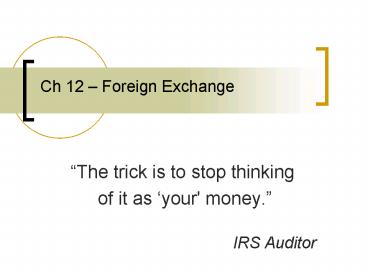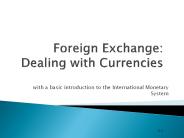Ch 12 Foreign Exchange - PowerPoint PPT Presentation
1 / 22
Title:
Ch 12 Foreign Exchange
Description:
Example: US importer enters into a contract to buy cars from France. ... In future, buy pounds at new lower spot rate and use them to pay back original loan. ... – PowerPoint PPT presentation
Number of Views:84
Avg rating:3.0/5.0
Title: Ch 12 Foreign Exchange
1
Ch 12 Foreign Exchange
- The trick is to stop thinking
- of it as your' money.
- IRS Auditor
2
Ch 12 Foreign Exchange
- Foreign Exchange
- International purchases require two transactions
- Foreign currency is bought.
- Currency is used to buy something.
- To buy American goods you need American dollars.
- Market where this exchange takes place is called
the foreign exchange market. - Very little trading in currency, mostly bank
deposit transfers. - Largest and most liquid market in the world,
operates 24 hours per day, all over the world.
3
Ch 12 Foreign Exchange
- Types of FX Transactions
- Spot Transaction
- Purchase and sale of foreign currency for cash
settlement not more than two days after date of
transaction. - Two days gives buyers and sellers time to arrange
details of trade. - Aka immediate delivery
- Agreement to buy or sell currency at current
(spot) exchange rate. - Forward Transaction
- Traders contract at stipulated (forward) exchange
rates for future transactions. - If dealer knows today they will be buying
something with yen in six months, the contract
today to pay certain agreed upon price to reduce
risk of price increase in six months. - More than 2 days in the future (can be months or
years). - Exchange rate is fixed when contract is made, but
money does not change hands until trade takes
place.
4
Ch 12 Foreign Exchange
- Types of FX Transactions
- Currency Swap
- Banks engage in these transactions to trade
currencies they currently dont need for
currencies they do. - Conversion on currency to another currency with
agreement to reconvert back to original currency
at set time in the future. - Rates of both exchanges are agreed upon in
advance.
5
Ch 12 Foreign Exchange
- Interbank Trading
- Small number of large banks have active currency
trading operations (London, Tokyo, NY, Hong Kong,
Chicago . . .) - Sales to and from consumers, usually less than a
million units, called retail transactions. - Sales to and from other banks or corporations,
usually over a million units, called wholesale
transactions. - Trade between banks interbank market
- FX market is profit center for banks.
- Bid rate price bank will pay (buy price)
- Offer rate Price bank will take (sell price)
- Difference spread
6
Ch 12 Foreign Exchange
- Interbank Trading
- Bid rate price bank will pay (buy price)
- Offer rate Price bank will take (sell price)
- Difference spread
- Example
- .5851 / .5854
Bid (buy) rate
Offer (sell) rate
Simultaneously buying and selling one million
francs - will pay 585,100, will receive
585,400 net gain of 300.
7
Ch 12 Foreign Exchange
- Interbank Trading
- Profits can be increased if traders anticipate
changes in - exchange rates correctly.
- Example
- Suppose trader expects exchange rate of Japanese
yen to US dollar to go up (yen will appreciate
against the dollar). - Today 1.00 120 (1 .0083)
- Future 1.00 110 (1 .009)
- Dealer will raise bid and offer rates
- Raising bid rate persuades other dealers to
sell yen. - Raising offer rates dissuades other dealer from
buying yen. - When yen strengthens, dealer sells yen for
more than they paid.
8
Ch 12 Foreign Exchange
- Exchange Rate
- Price of one currency expressed in terms of
another. - ER / dollars needed to purchase one
pound. - ER 2 2/1 Requires 2 to purchase 1
- ER pounds required to purchase one dollar
- ER reciprocal of ER
- 1/ER ½ Requires 1/2 to purchase 1
9
Ch 12 Foreign Exchange
Exchange Rate Price of one currency expressed in
terms of another. Examples 1 euro 1.19528
USD 1 USD 1 / 1.19528 .836625 1 CAD
.74438 USD 1 USD 1 / .74438 1.34340
- Dollar price of a pound increased from Tue to
Wed. - Dollar depreciated against the pound.
- Pound appreciated against the dollar
10
Ch 12 Foreign Exchange
Cross Exchange Rate Used if the desired relative
exchanges of currencies does not include US
dollar, or a known exchange rate. To find the
exchange rate between the British pound and Swiss
francs, need to express them in terms of US
dollar value of British pound 1.79066
value of Swiss francs 0.77034
Each British pound buys 2.3245 Swiss francs.
11
Ch 12 Foreign Exchange
- Arbitrage Opportunities in FX
- Arbitrage buying in one market with the intent
of immediately reselling in another market to
profit from price discrepancies. - In FX markets, exchange rates tend to be
consistent between locations within the market. - Exchange arbitrage tends to equalize prices and
eliminate further arbitrage opportunities.
price
S
2.05
D
Q Pounds
London
New York
12
Ch 12 Foreign Exchange
- Arbitrage Opportunities in FX
- Arbitrage buying in one market with the intent
of immediately reselling in another market to
profit from price discrepancies. - Purchase pounds in NY at 2.00 per pound, resell
immediately in London for 2.05 per pound. - Increase in demand in NY will push NY price up,
increased supply in London will push London price
down. - Arbitrage will force prices to equalize until
arbitrage opportunities are gone.
price
price
S
S
2.05
2.00
D
D
Q Pounds
Q Pounds
London
New York
13
Ch 12 Foreign Exchange
- Effective Exchange Rate (Trade Weighted Dollar)
- US dollar may appreciate against some currencies
and depreciate against others. - The effective rate is determined by the weighted
average between dollar and currencies of most
important trading partners. - Weights are given based on relative importance of
trading partners. - Reported as an index using 1973 as base year.
14
Ch 12 Foreign Exchange
- Forward Market
- In spot market, currencies are bought and sold
for immediate delivery. - In forward market, currencies are bought and sold
for future delivery, usually 1 month, 3 month, 6
month. - Exchange rate is agreed upon at time of
transaction, but payment is not made until
delivery takes place. - Forward rate rate of exchange used for forward
transactions. - Forward rates reflect market consensus about what
the currency will do in the future (what the
market believes). - If forward rate is higher than spot rate,
currency is said to be trading at a premium. If
forward rate is lower than spot rate, currency is
trading at a discount.
15
Ch 12 Foreign Exchange
Forward Market
- Forward rates indicate what market believes spot
rates will be in 1 month, 3 months, 6 months. - Pound is trading at a forward discount against
the dollar. - Market believes that the dollar price of the
pound will decrease in future.
16
Ch 12 Foreign Exchange
- Forward Market
- Forward market is used to protect traders,
investors, firms, from volatility in currency
markets. - Traders can hedge against unexpected dollar
appreciation or depreciation. Most helpful for
dealers that dont do huge number of transactions
in foreign market (small to midsize firms). - Example US importer enters into a contract to
buy cars from France. If dollar depreciates
against euro before money can be paid (euros
become more expensive), importer will be worse
off. He will protect himself (hedge against
depreciation) by locking in at forward rate for
money owed. - Many large corporations do not hedge foreign
currency trades. They believe gains and losses
of foreign currency trades balance over the long
run, so they avoid transaction costs of the
market by not hedging in forward market (can
avoid currency fluctuations by becoming MNE).
17
Ch 12 Foreign Exchange
- Speculation in FX Market
- Speculation is the attempt to profit by trading
on expectations about future prices. - Different from arbitrage trading in concurrent
markets, with little to no risk. - Speculation has risk.
- Foreign currency speculators can profit by
betting against what the market believes will
happen in the future with currency prices. - Long position Buying low today, selling high
tomorrow (aka buy long, go long). - Short position Borrowing or selling forward
before you own the currency (aka buy short, go
short).
18
Ch 12 Foreign Exchange
- Speculating in the Spot Market
- CASE 1
- Speculating on Appreciation of the British Pound
- ( price of will increase)
- Buy pounds at todays spot rate, deposit in bank
- In future, sell pounds at higher spot rate
- Example
- Spot rate today is 1 167
- We are betting that the spot rate will increase
to 175 - Buy 1,000 today for 1,67000, then sell in
future for 1,75000. - Profit 8000 (if were right)
19
Ch 12 Foreign Exchange
- Speculating in the Spot Market
- CASE 2
- Speculating on Depreciation of the British Pound
- ( price of will decrease)
- Borrow pounds today and exchange for dollars at
current spot rate, deposit dollars in bank. - In future, buy pounds at new lower spot rate and
use them to pay back original loan. - Example
- Spot rate today is 1 167
- We are betting that the spot rate will decrease
to 150 - Borrow 1,000 today, exchange for 1,67000
- Deposit 167000 in bank to earn interest (need to
make up interest being paid on borrowed ) - In future when spot rate decreases to 150, buy
1,000 for 1,50000. - Use pounds to pay back original loan.
- Profit 17000 (/- net interest)
20
Ch 12 Foreign Exchange
- Speculating in the Forward Market
- Most speculation done in forward market.
- Based on belief that the future spot price and
the current forward price will be different in
the future. - Example Suppose 30-day forward pound is selling
at a 10 premium (market believes 30 days from
now spot rate will be 10 higher than todays
spot rate). - To make money in speculation, trader would have
to believe that market is wrong.
21
Ch 12 Foreign Exchange
- Speculating in the Forward Market
- CASE 1
- Speculating that spot rate of British Pound will
be higher in 3 months than its current 3-month
forward rate - Contract to buy pounds in forward market at
3-month forward rate. - Fill the contract (buy the pounds) in 3 months
and immediately resell in spot market at higher
spot rate. - Example
- 3-month forward rate today is 1 167
- We are betting that the spot rate in 3 months
will be higher than the forecasted rate, perhaps
175 - Enter into contract to buy 1,000 in 3 months for
1,67000. - Three months from now, buy the contracted 1,000
for the agreed upon 1,67000. - Immediately resell the 1,000 in the spot market
for 1,75000. - Profit 8000 (if were right).
22
Ch 12 Foreign Exchange
- Speculating in the Forward Market
- CASE 2
- Speculating that the spot rate of British Pound
will be lower in 3 months than its current
3-month forward rate - Contract to sell pounds in forward market at
3-month forward rate. - In three months, purchase that quantity of pounds
in spot market and use them to fill the forward
contract. - Example
- 3-month forward rate today is 1 167
- We are betting that the spot rate in 3 months
will be lower than the forecasted rate, perhaps
150. - Enter into contract to sell 1,000 in 3 months
for 1,67000. - In 3 months, buy 1,000 in spot market for
1,50000. - Use these pounds to fill the forward contract.
- Profit 17000 (if were right).































